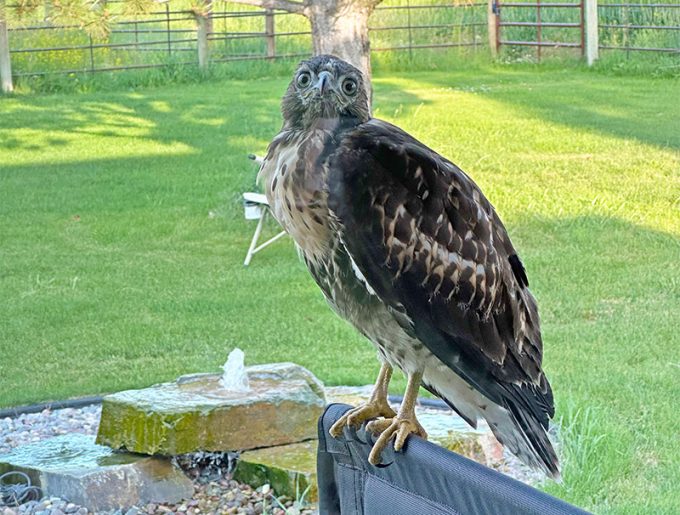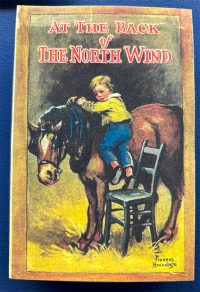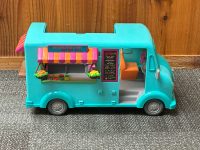“If I take the wings of the morning, and dwell in the uttermost parts of the sea; Even there shall thy hand lead me, and thy right hand shall hold me.”
Psalm 139:9-10 (KJV)
When my husband, Arlin, and I visited Fort Worth, Texas, we signed up to fly inside the Douglas C-49J “Southern Cross.” I was thrilled to arrive at the Vintage Flying Museum at Meacham Field a day before weather forecasters predicted thunderstorms, lightning, and rain—and discontinued flights. The museum certainly lived up to its mission: to preserve America’s flying heritage in word, deed, and action.
Once near the aircraft, our busload full of rowdy retired Flying Tiger pilots and spouses plastered their faces against the windows, watching a female loadmaster walk near the left wingtip of what civilians affectionately call the DC-3. The bird was magnificent! The pilot and co-pilot executed an engine run-up, a required checklist item to ensure engine parameters and instruments operated in the green. It didn’t faze me when the left radial blew smoke out the exhausts, sputtered, and stopped: all part of a thorough pre-flight inspection before we could board. 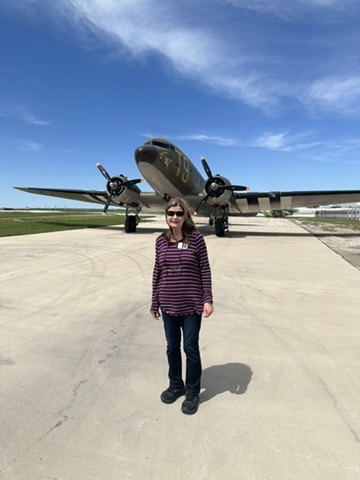
After the engine shutdown and a forty-minute delay, our seventeen passengers disembarked the bus and huddled as close to the chain-link fence as possible. One of the wing walkers, responsible for ensuring the wings don’t hit anything until safely on the runway centerline, informed us we could stand in front of the plane for pictures. Boy, did I want to. How could I get a step closer to those giant wings?
I was the first to slip through the gate. As I approached the aircraft, I half expected the plane, like the sandhill cranes back in Montana, to jump up and down, squawk, and try to scare me away. But the regal and sleek lady waited until I stood near her nose, then moved to her Wright Cyclone Engines—1820 horsepower and running on nine cylinders.
After photos, half our group slipped inside the hangar for shade; the remaining group, including me, stood like eager children at the zoo, waiting for a glimpse of a bear popping outside the cave.
The captain and co-pilot started engines again, and Crew Chief Benjamin Carter stood back and gestured with hand signals to the cockpit. I loved hearing the low rumble of turning pistons and seeing dust blowing sideways and toward the sky. Goosebumps prickled against the back of my arm, and I held high hope we would board promptly. After the engine shut down, the captain gave the thumbs-up sign.
“Welcome aboard,” the loadmaster said, motioning to the airstair behind the left engine. The propeller glistened in the sunlight. One of the wing walkers stood at the bottom of the stairs, extending his hand to anyone who wanted more balance.

“Thank you for your chivalry,” I said, taking his hand gladly and thankful for such a willing heart of service. The stairs wobbled underneath my weight, and I felt like I was climbing the stairway to heaven!
Inside the fuselage, the comfy seats took me by surprise. I half expected rigid backboards that slap you in the back of the legs and pinch if you’re not careful, like the seats in older movie theaters. My husband gave me the first choice of a seat, and I plopped into a window seat aft of the left engine to keep an eye on the spinning propellers.
“I’m your flight attendant,” the woman said once everyone was seated. She wore a comfortable-looking jumpsuit and a pretty smile. She pointed her flashlight to the cable running along the ceiling, just aft of the cockpit to the entrance door. “Don’t pull or lean on the cable,” she said. “Hold onto a passenger seat if you need to steady yourself or get up to take pictures.”
I wanted a picture of those beautiful DC-3 wings. As I leaned forward to take a photo, the loadmaster explained about a passenger who lost her cell phone out the porthole. Right away, I stuffed my iPhone inside the small pocket in front of my knees, next to the barf bags.
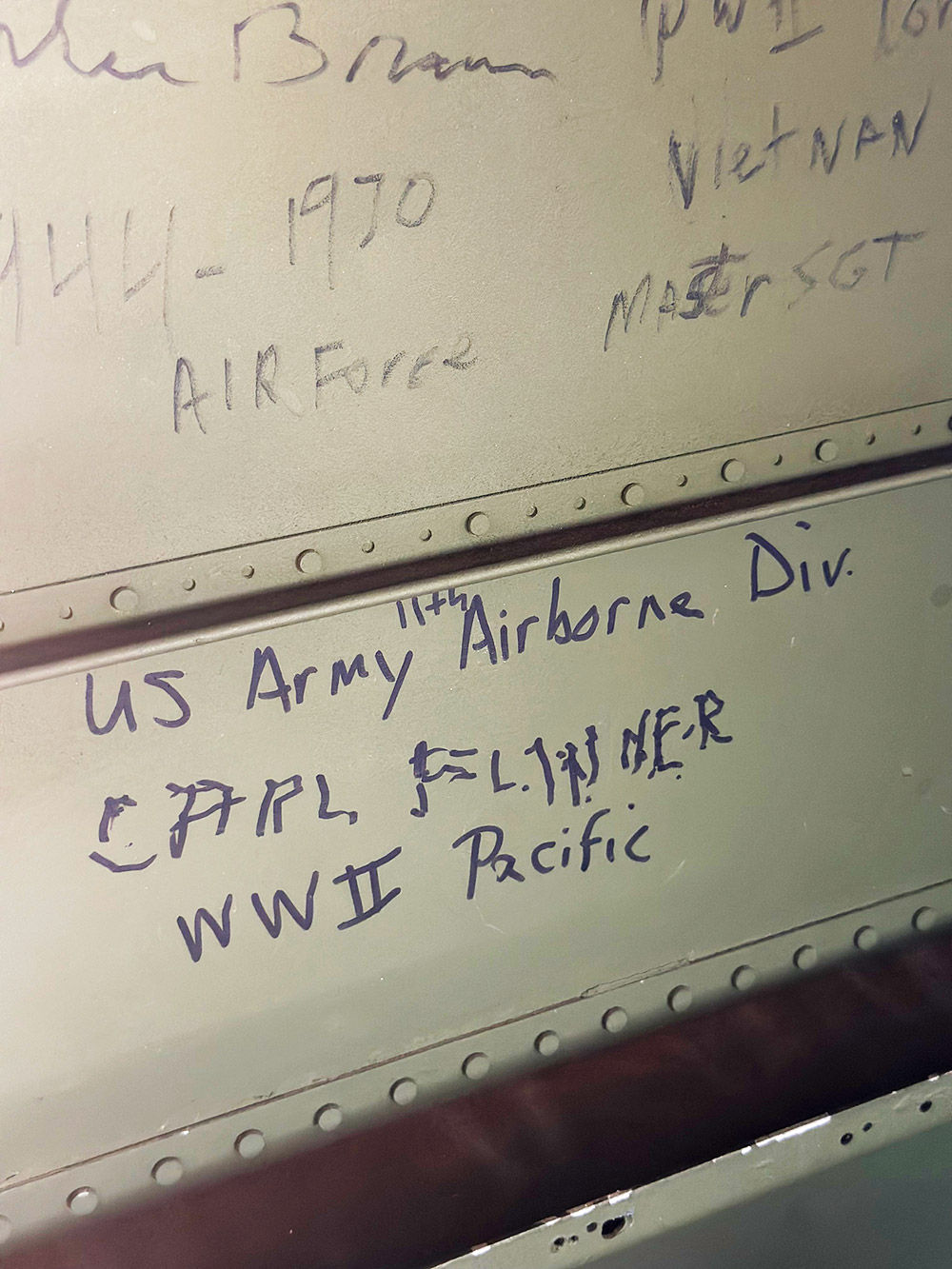
Scribbled on the left and right of the fuselage, I read the name and rank tattooed on the metal of a US Army 11th Airborne Division soldier from World War II, Pacific. Above the engraving was a Vietnam Airforce Master Sergeant from 1944-1970 and another from the US Navy USS Cabot, 1946-1950.
I held my breath as I read the names. Was I sitting in one of their seats? I almost heard their “Go!” shouts as I imagined soldiers exiting the doorway and tumbling toward the rice patties below.
When I raised a few inches in my seat, I spotted another signature etched into the fuselage. The call sign, “Spooky,” for an AG-4 Vietnam Sergeant, 68-69, disappeared through the doorway of my imagination, and I couldn’t help but wonder if he were a seventy-three-year-old retiree still alive and sipping iced tea. I hoped so.
I searched for a signature from “the uttermost parts of the sea” from the Invasion of Normandy as the captain pushed the throttles forward for another run-up on the tarmac. Once again, the left engine sputtered and came to a stop.
“Sorry, folks,” the loadmaster said.
One of the Flying Tiger pilots stood. “We can take it around the patch on one engine.” His eyes twinkled.
“No thanks,” a spouse said.
Crew Chief Carter boarded the plane. “I’m very sorry, folks, but the diaphragm inside the carburetor failed, and for safety in the flight, we can’t take this aircraft.”
“We, of all people, know about maintenance delays,” a Tiger pilot said.
I couldn’t believe how calm I felt. The younger me would have sighed, squirmed in my seat, and curled my fists for flying from Montana to Dallas and not feeling the air currents lift the aircraft to the clouds, the wings rocking.
But I’m older now, and even though I felt as excited as a kid opening a present at Christmas, I realized that my Good Father in Heaven was protecting me, my husband, and all the passengers. God knew about the carburetor needing repair before an engine could shut down in flight. Undoubtedly, we could have buzzed around the airport on one engine and successfully landed, but God prevented the flight before take-off.
My heavenly father knew every passenger on that plane, including those signatures on the wall, and cared deeply about the welfare of His children. Like the precious promise of Psalm 139:9-10, God held us by our right hands and led us out the aircraft door.
“Next time,” I whispered into the wind.





